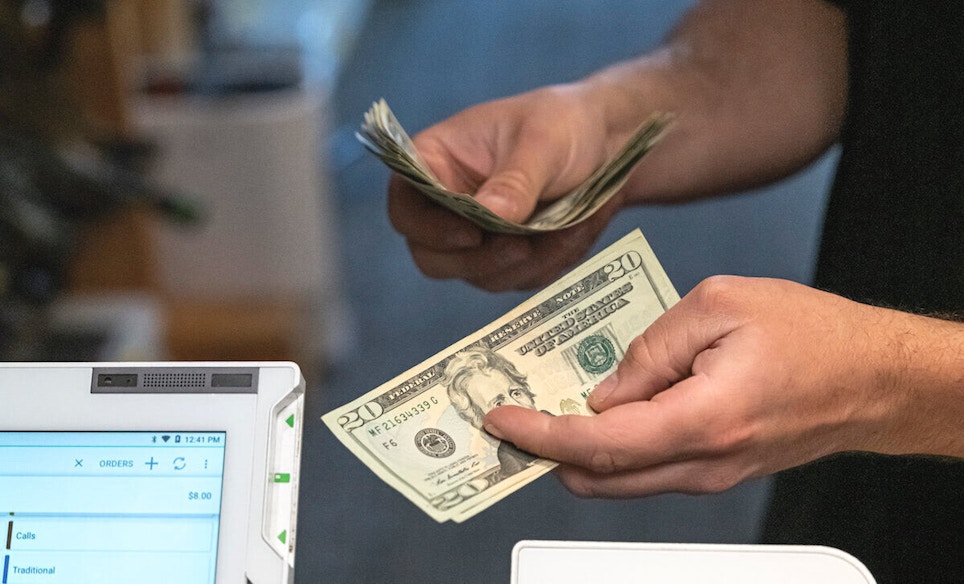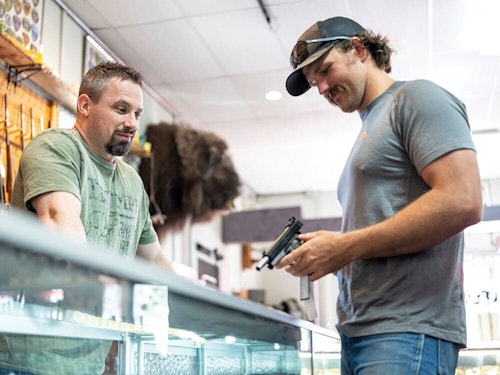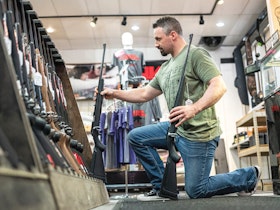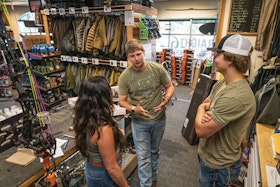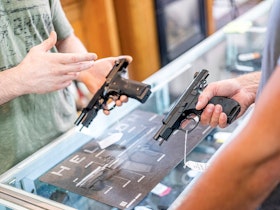If you’re in the business of selling firearms and related gear, the shooting sports are more than just a hobby to you. Sure, you might love guns and enjoy shooting them, but you’ve got to make a living before you can do all that fun stuff.
That goal can be made easier if you tap into some of the best prospective purchasers available — namely return customers. That’s because return customers are easier to market and sell to, tend to spend more than new customers on each purchase, often spend more at key times of the year for your business and are more likely to share their good experience of dealing with your retail outlet with others in their circle of influence.
Research has proven customers become more and more likely to purchase from your shop each time they make another purchase. After a customer has made one purchase, that customer has a 27% chance of returning to your store. And if you can get that customer to come back and make a second and third purchase, he or she has a 54% chance of coming back and spending money again in the future.
Steve Dill has been selling guns at H&H Gun Range in Oklahoma City for more than 20 years. He says those retailers who don’t have a strong focus on return customers are missing the boat.
“If you’re not focused on them, you’re going to lose a lot of sales,” Dill says. “Even though some guys might only buy one gun a year, you want them to come back to you to buy that gun.”
Following are some tips for targeting return customers to enhance your bottom line, and for using return customers to draw in new ones.
Know Your Customers
For H&H’s Dill, return customers are his bread and butter. In fact, he estimates that more than half of his sales are to customers he has sold firearms to in the past.
To turn customers into return customers, Dill says you need to get to know them above and beyond trying to make a quick sale, thereby building loyalty.
You know, just basically try to remember what they like. You know, if there's a certain type of gun, that certain thing they're looking for, a specific brand or style.
“I know their names, and I call them by name,” Dill says. “I've been dealing with a lot of these guys for 15-plus years.
“I also try to remember what they like so I’ll recognize them when they come in. And I know if there's a certain type of gun, that certain thing they're looking for, whether a specific brand or style. People like it when you remember something like that.”
To further build the relationship, Dill manages a Christmas card list of more than 100 customers that he sends season’s greetings to each year. His loyalty to customers he has worked with in the past forges a loyalty from the customer side, also.
“For a lot of the guests I’ve dealt with for years, if I’m not there they won’t buy a gun,” he says. “Some of them just say, ‘Thank you,’ and turn around and walk out. Also, sometimes if I'm with another guest, people wait for me to be freed up. That’s a good feeling to have that loyalty going both ways.”
Concentrate On Service
A few years back I interviewed a longtime acquaintance who has been in the retail business for more than four decades, the last several years as a manager of a number of very large retail stores. As we discussed targeting return customers, he continued to return to the topic of customer service. Each time I’d try to steer him back to the topic at hand, he’d go full circle and end up back at customer service. Finally, I caught on.
The point he was trying to make is that if you don’t give customers excellent service the first time they buy a product — and every time after that — they won’t continue to be return customers. Instead of being an asset to your business, they could become a liability.
Dill also believes in this philosophy. And he believes that the most important aspect of customer service is to remember the old “golden rule” we were all taught back in kindergarten.
“It’s not rocket science. Know your product, and be nice,” Dill says. “Be kind and treat people the way you want to be treated when you go out to buy something.”
One customer service aspect that Dill has found successful for targeting return customers is being careful to respond to every contact from a customer, regardless of how that contact is made.
“I try to return emails when I get them, whether they're directly to me or whether they are forwarded to me from the manager, he says. “People appreciate that and it helps build clientele.
“It’s the same with returning voicemails. When I get a voicemail concerning gun sales, I always return that. People are sometimes quite surprised when you return a voicemail because so many times they leave a voicemail or send an email and never hear back on it.”
Try A Loyalty Program
Customer loyalty programs have long been productive for those wanting to sell products to return customers. One of the most successful I’ve seen is a local grocery store chain that offers “fuel points” for money spent in the store. Buy $50 in groceries, and you receive three “fuel points,” which will save you 3 cents per gallon on up to 20 gallons of gas with a local convenience store chain. In reality, the grocery chain’s prices are higher than some others in the area and the few cents saved on gas shouldn’t be able to draw frugal shoppers to the store to buy a cart of groceries that cost $10 more. But the allure of saving a dollar or so at the pump keeps the store’s parking lot packed and cash registers ringing.
Such customer loyalty programs can work equally well for firearms retailers. At H&H, where Dill works, gun purchasers receive a card that grants them three free range visits for two shooters over the next 90 days. That not only brings the gun buyer back, but also a friend or shooting partner.
“That’s worth about $60, and it gets them back through the door,” Dill says. “It gets them back in to shoot, try their gun, maybe find some ammo, targets and other things. Plus think about another gun.
“Getting them back through the door is a big deal. You want to try to keep them in your four walls, not shopping somewhere else.”
Another idea that has proven successful in a number of shops is creating an ammo purchase program with a card to be punched after every $50 of ammo purchases. When all the slots are punched, the customer would get a free box of .223 ammo or some other preset award that is valuable enough to draw customers but not so valuable that the promotion doesn’t pay off.
Utilize Recommendations
Brandon Wexler has been running WEX Gunworks in Delray Beach, Florida, for the last 15 years. In that time, he’s sold a lot of firearms and has also cultivated a large cadre of return customers, who are a very important part of his business.
“Return customers are extremely important, and at WEX Gunworks what we do is say, ‘We don't want a customer. We want a friend,’” Wexler says. “And we really do. We're all in it for the same reason. When I was a kid, my dad said, ‘Look, you treat people with respect. It's not all about making the sale.’ So, at my shop, customer service is number one.”
Wexler said one important aspect of the relationship built between salesmen and customers — or in his case, “friends” — is that return customers tell their friends about your business and how they were treated. Such personal referrals are about the best recommendation you can get, and they lead to more satisfied customers who are likely to return again.
“So, if you have someone come in that has a great experience, now they’re with you,” he says. “They’re going to tell their friends. So repeat customers, or as I call them friends, are imperative because they exponentially grow your business because they tell their friends.”
Consider Social Media
Through a lot of hard work, Wexler built up an Instagram following of over 70,000 people, with many of them past customers who had already purchased from his establishment. And he was doing great business as a result of his Instagram focus.
“I would use Instagram for the whole country,” Wexler says. “That's how we got our friends and customers. And I didn't do much — just a short story or a picture.”
Often that would be shared or reposted by manufacturers or just friends of the store, reaching even more people and keeping WEX Gunworks fresh on their minds for the next time they want to buy a firearm.
Unfortunately, that aspect of Wexler’s business was scuttled after he posted details of how his bank had dropped his business out of the blue simply because they were trying to distance themselves from the firearms industry. He also did a number of media interviews talking about the matter.
Days later, and Wexler believes because of that post and those interviews, Instagram shut down his account saying he was selling firearms — despite the fact that he had never offered firearms for sale in any of his social media interactions. Still, because of the immense success he had, he’d go back to that strategy in a moment if his account were ever to be unblocked.
Related to social media, Google reviews by previous satisfied customers are also very important to Wexler’s sales success and drive a lot of new “friends” to his shop.
“I tell our customers, our friends, if you don't mind, take 30 seconds to a minute and tell us what you think of the shop,” Wexler says. “I don't ask for a good review. I just ask them to tell us what they think of the shop and leave it in their hands. Our reviews are phenomenal from it.”
The sheer number of reviews WEX has received — over 300 — is quite impressive. And since the vast majority of the reviews are very positive, these satisfied customers are driving even more people to his shop.
“When somebody is looking for a gun shop and they see you and they see all your Google reviews, they decide to give us a try,” Wexler says. “We get it every single day: ‘We’re here because you guys have awesome reviews.’ Then after visiting, they say, ‘You got five-star reviews and you guys really are like this!’”
In the end, targeting your existing clients is perhaps the smartest move you can make to gain goodwill and sell more products. Doing so in a number of different ways can help you engage with them to ensure a long-lasting relationship that is mutually beneficial.
